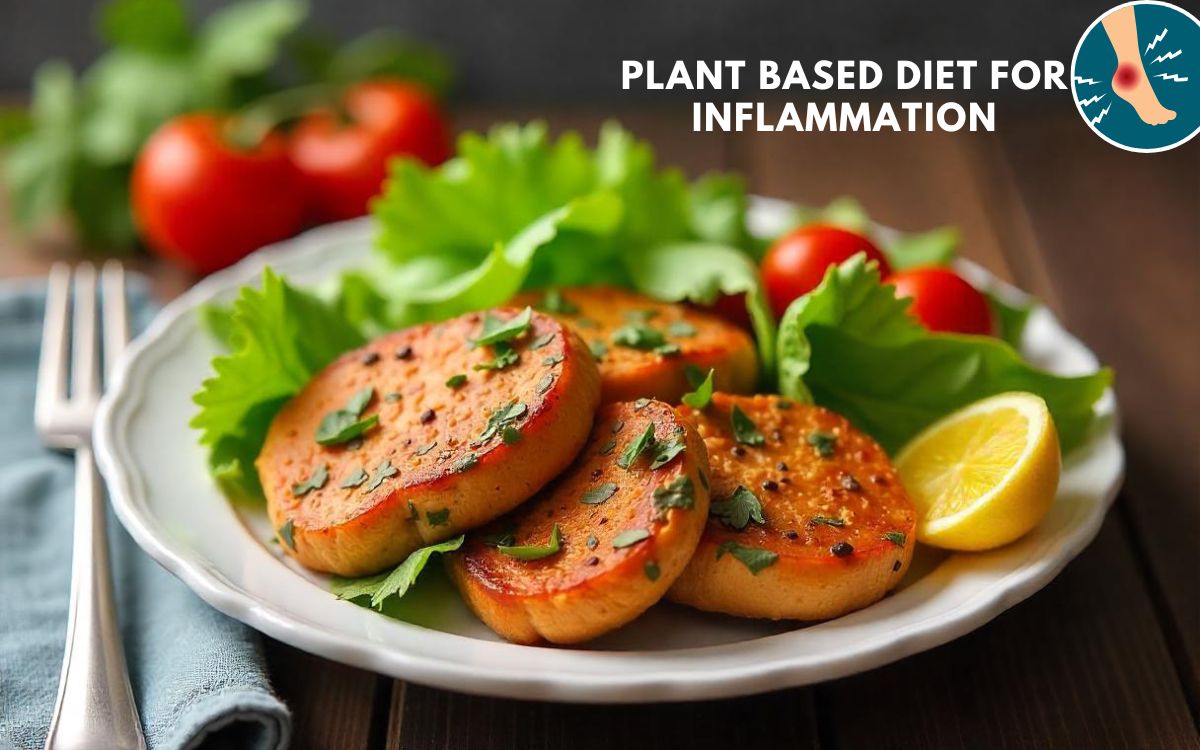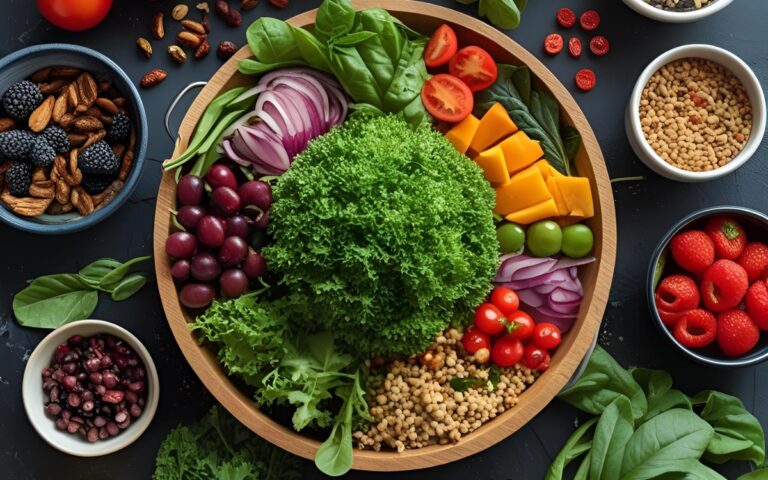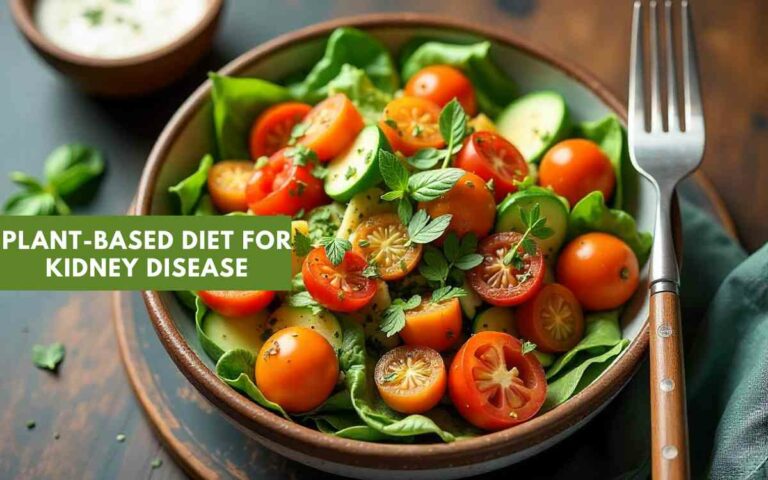Plant-Based Diet for Inflammation: Nature’s Healing Power
Inflammation can cause discomfort and health issues. A plant-based diet may help.
This dietary approach focuses on foods that reduce inflammation in the body. Fruits, vegetables, nuts, and seeds are key components.
These foods contain antioxidants and nutrients known to support health. Reducing inflammation can lead to less pain and better well-being.
Many find that shifting to plant-based eating improves their quality of life. It can also aid in managing chronic conditions.
Exploring this diet offers a natural way to address inflammation. Embracing a plant-based lifestyle might be the change you need for better health.
Dive into this guide to learn more about how plants can fight inflammation. Discover the benefits and start your journey toward feeling better today.
Key Takeaways:
Expert Guidance:

Plant-based Diet Essentials
Embracing a plant-based diet can be an effective way to combat inflammation. This dietary approach focuses on consuming whole, nutrient-rich foods derived from plants.
Understanding the essentials of a plant-based diet helps ensure you enjoy its anti-inflammatory benefits.
Key Components
To start a plant-based diet, focus on whole foods. These include fruits, vegetables, legumes, nuts, and seeds. Whole grains are also crucial.
They provide fiber and nutrients that support overall health. Avoid processed foods and refined sugars. These can increase inflammation in the body.

Nutrient-rich Foods
Fruits and vegetables are rich in vitamins and antioxidants. These nutrients reduce inflammation effectively.
Berries, leafy greens, and cruciferous vegetables are particularly beneficial. Legumes like lentils and beans offer protein and fiber. They help maintain healthy digestion.
Nuts and seeds are excellent sources of healthy fats. They also provide essential minerals and vitamins.
Incorporate a variety of colorful foods in your meals. This ensures you receive a wide range of nutrients.
Eating diverse plant-based foods supports overall health. It also helps reduce inflammation naturally.
Inflammation And Health
Inflammation is a natural process in your body, meant to protect and heal. However, when inflammation becomes chronic, it can lead to a host of health issues.
Understanding its impact on your health is crucial. A plant-based diet can be a powerful tool in managing inflammation.
Let’s explore how it affects your body and what chronic conditions are linked to it.
Effects On The Body
Inflammation can manifest in various ways. You might notice joint pain or fatigue. Sometimes, it can even affect your mood.
A diet rich in fruits, vegetables, and whole grains can help reduce these symptoms. They are packed with antioxidants and nutrients that fight inflammation.
Your body reacts to what you eat. Foods high in sugar and processed ingredients can increase inflammation.
By choosing plant-based options, you give your body the chance to heal naturally. Think about how different you could feel if you switched your burger for a hearty salad!
Chronic Conditions Linked
Chronic inflammation is linked to several health conditions. Heart disease, diabetes, and arthritis are just a few examples.

These conditions can drastically affect your quality of life. A plant-based diet can lower the risk of developing these issues.
Consider the impact of changing your diet on your long-term health. Could a plate of leafy greens and colorful veggies be the key to feeling better?
Many people find that adopting a plant-based diet reduces their symptoms and improves their overall well-being.
What changes can you make today to start benefiting from a plant-based diet? Small steps can lead to significant improvements.
Your health depends on the choices you make. Embrace the power of plants and give your body the support it needs.
Natural Anti-inflammatory Foods
A plant-based diet offers a wealth of benefits for reducing inflammation. Natural anti-inflammatory foods play a crucial role in soothing the body’s immune response.
These foods are rich in nutrients and compounds that help fight inflammation. Discover the power of nature’s bounty in these nourishing choices.
Fruits And Vegetables
Fruits and vegetables are packed with antioxidants and vitamins. Berries, such as blueberries and strawberries, are excellent choices.
They contain anthocyanins, which reduce inflammation. Leafy greens like spinach and kale offer vital nutrients.

They are high in vitamins A, C, and K, which support overall health. Tomatoes are another great option. They contain lycopene, a powerful anti-inflammatory compound.
Herbs And Spices
Herbs and spices add flavor and combat inflammation. Turmeric is a popular choice, known for its active compound curcumin.
Curcumin has strong anti-inflammatory properties. Ginger is another powerful spice. It helps reduce inflammation and ease joint pain.
Rosemary contains antioxidants that fight inflammation. These herbs and spices not only enhance taste but also boost health.
Benefits Of Plant-based Eating
Switching to a plant-based diet can significantly benefit your health. Many people find that eating more fruits, vegetables, grains, and nuts reduces inflammation.
This dietary choice can lead to noticeable changes in overall well-being. Plant-based eating provides a variety of nutrients crucial for maintaining good health. Let’s explore some specific benefits of adopting this lifestyle.
Improved Wellbeing
Plant-based foods can enhance your mood and energy levels. Eating more greens and fruits often leads to better digestion.
You may find yourself feeling lighter and more energetic throughout the day. This diet can also improve skin health and promote a glowing complexion. Many people report feeling happier and more satisfied with their meals.
Reduced Disease Risk
A plant-based diet may lower the risk of chronic diseases. Consuming more plant foods can decrease the chances of heart disease.
Studies show that this diet can also reduce the risk of type 2 diabetes. Eating less meat and more plants often leads to lower cholesterol levels. This can have a significant impact on heart health.
Adopting A Plant-based Lifestyle
Adopting a plant-based diet can help reduce inflammation. Fruits, vegetables, and whole grains offer essential nutrients.
These foods support a healthier lifestyle by lowering inflammation markers in the body. Enjoy a variety of colorful plant foods to improve well-being and promote overall health.
Adopting a plant-based lifestyle can ease inflammation and boost overall health. This approach emphasizes whole, natural foods like fruits, vegetables, nuts, and seeds.
These foods are rich in antioxidants and nutrients. They help reduce inflammation in the body. A plant-based diet doesn’t mean giving up all animal products.
It can include plant-focused meals while occasionally consuming animal products.
This lifestyle may help reduce chronic diseases and improve energy levels. Transitioning to this way of eating can be smooth with some guidance.
Transition Tips
Start by adding more vegetables to your meals. Gradually replace meat with plant-based proteins like beans and lentils.
Explore new recipes that highlight vegetables and grains. Try meat-free days to ease into the change.
Focus on whole foods rather than processed options. Consider meal prepping to stay committed to your new diet. Join a community or group for support and inspiration.
Common Challenges
Some people find it hard to get enough protein. Include beans, nuts, and tofu to meet protein needs.
Cravings for old favorites might occur. Create plant-based versions of your favorite dishes.
Time constraints may make it tough to cook. Plan meals in advance and use batch cooking.
Dining out can be tricky. Research menus and choose restaurants with plant-based options.
Family and friends might not understand your choice. Share your reasons and offer to cook for them.
Frequently Asked Questions Of Plant-Based Diet for Inflammation
Does A Plant-based Diet Reduce Inflammation?
A plant-based diet can reduce inflammation due to high levels of antioxidants and anti-inflammatory compounds. Eating fruits, vegetables, nuts, seeds, and whole grains promotes health and minimizes inflammation.
Avoiding processed foods and animal products further reduces inflammatory markers, supporting overall wellness.
What Is The #1 Most Anti-inflammatory Food?
Turmeric is considered the #1 anti-inflammatory food. It contains curcumin, a powerful compound that reduces inflammation.
Adding turmeric to dishes can enhance flavor and promote health.
Consuming it regularly may help alleviate chronic inflammation and support overall well-being. Incorporate turmeric into your diet for its beneficial effects.
What Is The Strongest Anti-inflammatory Plant?
Turmeric is considered the strongest anti-inflammatory plant. Its active compound, curcumin, effectively reduces inflammation.
Turmeric is widely used in traditional medicine and supplements. It can be added to diets through spice or capsules for health benefits.
What Is The Downside Of A Plant-based Diet?
A plant-based diet may lead to nutrient deficiencies like vitamin B12, iron, or omega-3. Some individuals might experience digestive issues due to high fiber intake.
It can also be challenging to find diverse food options, potentially affecting meal variety and satisfaction.
Proper planning is essential for balanced nutrition.
Conclusion
Adopting a plant-based diet can ease inflammation effectively. Foods like fruits, vegetables, and whole grains are rich in nutrients.
They help reduce inflammation and support overall health. Choosing plant-based options offers numerous benefits for your body. They provide essential vitamins and minerals.
This diet supports a healthier lifestyle and may prevent chronic diseases. Consider incorporating more plant-based meals into your routine.
Your body will thank you for the positive change. Enjoy the journey towards better health with plant-based eating. Small changes can make a big difference.
Embrace this nutritious path today.






